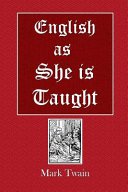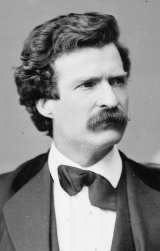English as She is Taught
As the greatest compliment that could be paid a writer would be the assumption that the material contained in this little volume was the product of that writer's ingenuity or imagination, it seems needless for the compiler to state that every line is just what it purports to be, - bona fide answers to questions asked in the public schools.
Mark Twain, with his inimitable drollery, comments in the "Century Magazine" for April, 1887, upon "English As She is Taught." Even this master of English humor acknowledges his inability to comprehend how such
Genre: Humour
Genre: Humour
- Year:
- 1887
- 898 Views
In the appendix to Croker’s Boswell’s Johnson, one finds this anecdote: Cato’s Soliloquy.—One day Mrs. Gastrel set a little girl to repeat to him [Doctor Samuel Johnson] Cato’s Soliloquy, which she went through very correctly. The Doctor, after a pause, asked the child— “What was to bring Cato to an end?” She said it was a knife. “No, my dear, it was not so.” “My aunt Polly said it was a knife.” “Why, Aunt Polly’s knife may do, but it was a dagger, my dear.” He then asked her the meaning of “bane and antidote,” which she was unable to give. Mrs. Gastrel said— “You cannot expect so young a child to know the meaning of such words.” He then said— “My dear, how many pence are there in sixpence?” “I cannot tell, sir,” was the half-terrified reply. On this, addressing himself to Mrs. Gastrel, he said— “Now, my dear lady, can anything be more ridiculous than to teach a child Cato’s Soliloquy, who does not know how many pence there are in sixpence?” In a lecture before the Royal Geographical Society, Professor Ravenstein quoted the following list of frantic questions, and said that they had been asked in an examination: Mention all the name of places in the world derived from Julius Cæsar or Augustus Cæsar. Where are the following rivers: Pisuerga, Sakaria, Guadalete, Jalon, Mulde? All you know of the following: Machacha, Pilmo, Schebulos, Crivoscia, Basecs, Mancikert, Taxhen, Citeaux, Meloria, Zutphen. The highest peaks of the Karakorum range. The number of universities in Prussia. Why are the tops of mountains continually covered with snow [sic]? Name the length and breadth of the streams of lava which issued from the Skaptar Jokul in the eruption of 1783. That list would oversize nearly anybody’s geographical knowledge. Isn’t it reasonably possible that in our schools many of the questions in all studies are several miles ahead of where the pupil is?—that he is set to struggle with things that are ludicrously beyond his present reach, hopelessly beyond his present strength? This remark in passing, and by way of text; now I come to what I was going to say. I have just now fallen upon a darling literary curiosity. It is a little book, a manuscript compilation, and the compiler sent it to me with the request that I say whether I think it ought to be published or not. I said Yes! but as I slowly grow wise, I briskly grow cautious; and so, now that the publication is imminent, it has seemed to me that I should feel more comfortable if I could divide up this responsibility with the public by adding them to the court. Therefore I will print some extracts from the book, in the hope that they may make converts to my judgment that the volume has merit which entitles it to publication. As to its character. Every one has sampled “English as She has Spoke” and “English as She is Wrote”; this little volume furnishes us an instructive array of examples of “English as She is Taught”—in the public schools of—well, this country. The collection is made by a teacher in those schools, and all the examples in it are genuine; none of them have been tampered with, or doctored in any way. From time to time, during several years, whenever a pupil has delivered himself of anything peculiarly quaint or toothsome in the course of his recitations, this teacher and her associates have privately set that thing down in a memorandum-book; strictly following the original, as to grammar, construction, spelling, and all; and the result is this literary curiosity. The contents of the book consist mainly of answers given by the boys and girls to questions, said answers being given sometimes verbally, sometimes in writing. The subjects touched upon are fifteen in number: I. Etymology; II. Grammar; III. Mathematics; IV. Geography; V. “Original”; VI. Analysis; VII. History; VIII. “Intellectual”; IX. Philosophy; X. Physiology; XI. Astronomy; XII. Politics; XIII. Music; XIV. Oratory; XV. Metaphysics. You perceive that the poor little young idea has taken a shot at a good many kinds of game in the course of the book. Now as to results. Here are some quaint definitions of words. It will be noticed that in all of these instances the sound of the word, or the look of it on paper, has misled the child: Aborigines, a system of mountains. Alias, a good man in the Bible. Amenable, anything that is mean. Assiduity, state of being an acid. Auriferous, pertaining to an orifice. Ammonia, the food of the gods. Capillary, a little caterpillar. Corniferous, rocks in which fossil corn is found. Emolument, a headstone to a grave. Equestrian, one who asks questions. Eucharist, one who plays euchre. Franchise, anything belonging to the French. Idolater, a very idol person. Ipecac, a man who likes a good dinner. Irrigate, to make fun of. Mendacious, what can be mended. Mercenary, one who feels for another. Parasite, a kind of umbrella. Parasite, the murder of an infant. Publican, a man who does his prayers in public. Tenacious, ten acres of land. Here is one where the phrase “publicans and sinners” has got mixed up in the child’s mind with politics, and the result is a definition which takes one in a sudden and unexpected way: Republican, a sinner mentioned in the Bible. Also in Democratic newspapers now and then. Here are two where the mistake has resulted from sound assisted by remote fact: Plagiarist, a writer of plays. Demagogue, a vessel containing beer and other liquids. I cannot quite make out what it was that misled the pupil in the following instances; it would not seem to have been the sound of the word, nor the look of it in print: Asphyxia, a grumbling, fussy temper. Quarternions, a bird with a flat beak and no bill, living in New Zealand. Quarternions, the name given to a style of art practised by the Phœnicians. Quarternions, a religious convention held every hundred years.
Translation
Translate and read this book in other languages:
Select another language:
- - Select -
- 简体中文 (Chinese - Simplified)
- 繁體中文 (Chinese - Traditional)
- Español (Spanish)
- Esperanto (Esperanto)
- 日本語 (Japanese)
- Português (Portuguese)
- Deutsch (German)
- العربية (Arabic)
- Français (French)
- Русский (Russian)
- ಕನ್ನಡ (Kannada)
- 한국어 (Korean)
- עברית (Hebrew)
- Gaeilge (Irish)
- Українська (Ukrainian)
- اردو (Urdu)
- Magyar (Hungarian)
- मानक हिन्दी (Hindi)
- Indonesia (Indonesian)
- Italiano (Italian)
- தமிழ் (Tamil)
- Türkçe (Turkish)
- తెలుగు (Telugu)
- ภาษาไทย (Thai)
- Tiếng Việt (Vietnamese)
- Čeština (Czech)
- Polski (Polish)
- Bahasa Indonesia (Indonesian)
- Românește (Romanian)
- Nederlands (Dutch)
- Ελληνικά (Greek)
- Latinum (Latin)
- Svenska (Swedish)
- Dansk (Danish)
- Suomi (Finnish)
- فارسی (Persian)
- ייִדיש (Yiddish)
- հայերեն (Armenian)
- Norsk (Norwegian)
- English (English)
Citation
Use the citation below to add this book to your bibliography:
Style:MLAChicagoAPA
"English as She is Taught Books." Literature.com. STANDS4 LLC, 2024. Web. 19 Apr. 2024. <https://www.literature.com/book/english_as_she_is_taught_262>.




Discuss this English as She is Taught book with the community:
Report Comment
We're doing our best to make sure our content is useful, accurate and safe.
If by any chance you spot an inappropriate comment while navigating through our website please use this form to let us know, and we'll take care of it shortly.
Attachment
You need to be logged in to favorite.
Log In